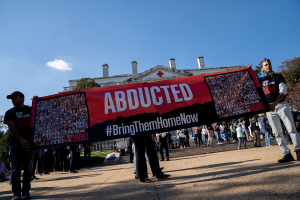How should churches respond in a post-Christian culture?

By the waters of Babylon,
there we sat down and wept,
when we remembered Zion.
On the willows there
we hung up our lyres.
For there our captors
required of us songs,
and our tormentors, mirth, saying,
“Sing us one of the songs of Zion!”
How shall we sing the LORD’s song
in a foreign land?
Psalm 137:1–4
Imagine how they felt. For four hundred years, ever since King Solomon finished building the grand Temple in Jerusalem, the Israelites had enjoyed free and rich worship in their land. David had successfully defeated most of Israel’s enemies, he had made all the preparations for the Temple and the worship to take place there, and under Solomon’s reign the kingdom flourished.
On the day of the Temple dedication many years ago, hundreds of Levitical singers joined with 120 trumpeters in the Temple courts as they made themselves heard in unison in praise and thanksgiving to the Lord: “For he is good, for his steadfast love endures forever” (2 Chron. 5:13). And ever since then, elaborate rituals of worship according to God’s instructions took place there for the benefit of all the people.
Yet false worship from the pagan nations crept into the land, and as a direct result of this terrible breach of God’s law, the kingdom split in two. Even then, faithful Israelites were able to worship God freely, and regular Temple practices continued.
That all changed in the early sixth century bc. Nebuchadnezzar swept into the land, and after several defeats and deportations, he finally destroyed Jerusalem, including its magnificent Temple. The Israelites now found themselves in a strange land. They no longer had their own culture, protected from foreign influence. They no longer had the Ark of the Covenant, their altars, or their Temple. They no longer had their worship.
Imagine how they felt. How could they take up their lyres and sing the songs they once sang in the splendor of that great city? How could they worship their God according to his instructions when they didn’t have the tools he required? How could they rejoice in his steadfast love when they were surrounded by their enemies? They were captives in Babylon; they had no reason to sing.
Instead, they sat down and wept.
Although the circumstances are certainly not exactly parallel, Christian worship in the West faces many of the same challenges as this tragic account of Israel’s captivity. Emperor Constantine’s legalization of Christianity in ad 313, and especially the establishment of Nicene Christianity as the state religion of the Roman Empire by Theodosius I in 380, created the conditions for what has come to be called Christendom—the union of church and state in the West such that Christianity and the West became almost synonymous. In fact, many of these early religious leaders envisioned Christendom as the New Israel, erecting ornate sanctuaries and altars, establishing a priesthood, and developing elaborate worship liturgies reminiscent of the Hebrew worship of old.
This situation persisted for hundreds of years, and while it was theologically problematic and led to many errors that resulted in need for Reformation, in the kind providence of God it did create some benefits. The most significant of these is likely the fact that free worship of the true God was permitted and even expected across the empire. The fruit of these freedoms is particularly evident in the Reformation worship traditions. With significant theological errors confronted, Reformation traditions of various stripes were enabled to perpetuate free and open God-centered, Bible-saturated worship.
Yet once again God’s people were taken captive. This time, however, the invasion was not by a pagan nation but by secular philosophies, ideas that questioned the supernatural and placed their trust fully in human autonomy and reason. These influential philosophies had begun to emerge much earlier, but during the eighteenth century they came to dominate thought in the West, putting to an end the impact Christian worship had enjoyed for hundreds of years.
The people of God once again found themselves in a strange land. But this time, many of them didn’t even notice.
Such is the context for what I address in this book. By all accounts Christendom is dead, and unbiblical beliefs have progressively permeated western thought, expectations, and culture. So how should churches respond to this seismic shift in their relationship to an increasingly post-Christian culture?
This question has been answered in several different ways in recent years: First, some churches continue to practice Christendom-shaped worship and completely ignore the unbelieving world around them. Churches were lulled into passivity during Christendom since everyone attended church, and thus failure to recognize the death of Christendom has left many churches impotent in their mission to evangelize the nations.
On the other hand, some churches have recognized their need to reach unbelievers with the gospel, yet they continue to operate with Christendom methods by expecting unbelievers to come to them. The church growth movement followed this pattern by insisting that a church’s primary service should be an evangelistic meeting designed to attract and meet the needs of “seekers.” This perspective drew fire from some who argued that this ignores worship altogether, others who complained that believers were not discipled, and still others who claimed that this “attractional” model of evangelism just did not work.
Yet in the past twenty years a new movement has emerged in evangelical Christianity that has reshaped the conversation in subtle yet profound ways by suggesting that the two priorities of worship and mission are not separate but in fact essentially connected, subsumed under the umbrella of the mission of God. Recognizing both the death of Christendom and the biblical necessity of reaching the unbelieving world, this missional church movement has significantly altered discourse about evangelism and worship, influencing evangelical churches with both a new posture toward culture in general and a new vocabulary regarding every aspect of its existence.
I believe that the missional church movement has had some positive impact upon worship in the evangelical church. As we shall see, it has caused churches to give much more careful consideration to how much of its worship methodology has been shaped by culture rather than Scripture and how it can recover believers’ worship that had been lost in the church growth movement’s evangelistic restructuring, while nevertheless making worship intelligible to unbelievers.
Yet in its noble ambition to recover truly missional worship, the missional church movement has failed to recognize how its own understanding of both worship and culture has been shaped by the Christendom and Enlightenment models it repudiates. Therefore, it is my contention that the full correction of errors regarding worship and evangelism that missional advocates rightly identify requires more careful study of culture and worship and their relation to evangelism from a biblical perspective.
Instead of allowing culture to determine the shape of our worship in order to reach the culture, I believe that biblically regulated, gospel-shaped corporate worship that communicates God’s truth through appropriate cultural forms will actually have the most missional impact in a post-Christian context.
The preceding is an excerpt from By the Waters of Babylon: Worship in a Post-Christian Culture by Scott Aniol (Kregel, 2015).




























